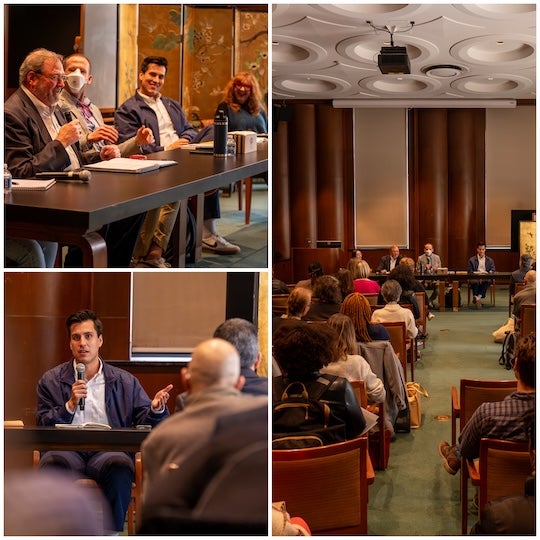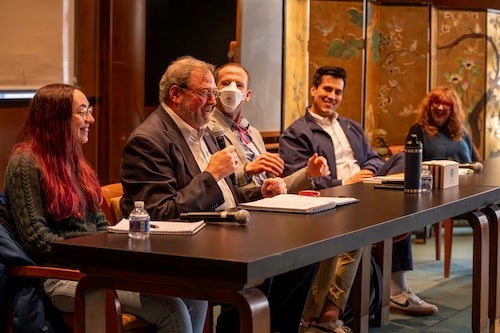Members of Rice University’s Office of Public Affairs hosted a panel discussion about the “practical civics” of how people can interact with local, state and federal government Feb. 13 at Fondren Library’s Kyle Morrow Room. The panelists explained the nuts and bolts of how individuals might navigate civics in impactful ways.
The panel was the first of three the Rice Faculty Senate has organized on practical civics meant to equip Rice faculty, students and staff with practical ways and resources to get more involved with their communities at multiple levels. The workshops are also sponsored by the Office of the Provost as part of the Rice Reflects series.
“These panels came about because a few faculty started to talk after a senate meeting in November, and we were lamenting that in our own education, civics had amounted to teaching us about how to use a voting machine,” said April DeConick, the Isla Carroll and Percy E. Turner Professor of Biblical Studies and Faculty Senate speaker. “None of us knew actually how to engage in specific activities beyond that. When we started asking other people around campus, we discovered that, lo and behold, we were not alone. There were many people frustrated because they also had no idea how to really make an impact on our social and political institutions.”

Moderated by DeConick, the panel included Joel Resendez, director of state government relations; Nathan Cook, senior director of government relations; Greg Marshall, director of university relations; and sophomore Nina Wallach.
Resendez, who had just returned from a work trip to the Texas Capitol in Austin, explained the legislative process of the state congress and provided inside know-how of the best ways to interact with elected officials and their staff. He said that the state legislative process, compared to that in Washington, D.C., moves much faster due to a shorter timeline. There’s only about two months to get bills done and move them through the committee process and two chambers of the state legislature.
“I worked in the Texas Senate, for a committee in the Senate, so I’m familiar with the engagement points and these processes, which I’m also happy just to provide insights on,” Resendez said. “In my experience, the best way to engage with, if there is a specific bill that you are interested in or have concerns about, is just to reach out to that office specifically and talk to the staffer that is responsible for that bill or that subject matter in that office.
“You can track all these things online. There’s tracking tools for specific bills or specific subject matters and what you’re interested in. But engaging with staffers is the best way to do it. If it’s something that you want to even promote, if it’s something that you want to advocate for, staffers always appreciate that too.”
Cook added encouragement that politics can take time and encouraged the attendees to stay involved with the staff and the legislative agenda even if a bill doesn’t fare the way you prefer.
“Nothing is ever settled,” Cook said. “It’s an ongoing process. So stay engaged.”
Being disinterested in politics will not shield you from the effect of politics, said Marshall, a Rice alumnus who is responsible for the university’s community relations, local government relations with the city of Houston and Harris County, protocol and oversight of the Rice Welcome Center. It’s important to stay informed and aware, he said.
“All politics is local,” Marshall said. “It’s really inextricable when you talk about our city council members and our commissioners court. Their interests very definitely mirror those of their constituents, who are our neighbors and you, so really getting to know local issues and things of concern to you and your neighbors is exactly what these folks are there to do.”
Wallach is majoring in social policy analysis and currently interning for U.S. Rep. Lizzie Fletcher in Fletcher’s district office. She’s also participated in advocacy work through Rice’s Center for Civic Leadership (CCL) and presented information on how to get involved in the community.
“There are tons of advocacy groups in Houston,” Wallach said. “If there’s any kind of social issue, environmental issue, whatever it is that you care about, there’s probably a group in Houston that does something about it.”
Wallach also explained that Houston is divided into “super neighborhoods,” a system created by the city to encourage residents in neighboring communities to work together for the concerns of the broader community. This hyperlocalized way to get involved in community advocacy can provide a stepping stone to other systems of civic engagement. The CCL also has an abundance of programs for students and faculty to get involved with advocacy.
“There are social policy analysis programs at Rice,” Marshall said. “There are a number of different projects in each academic school where you can turn your interests and expertise into something that is real, relevant and actionable — from the academic world straight into implementation and policy in the city and then the county.”
The next seminar in the Practical Civics series titled “Civic Engagement” March 10 will examine the many ways to engage in local communities for positive change through nongovernmental and community organizations. RSVP here by March 5.

